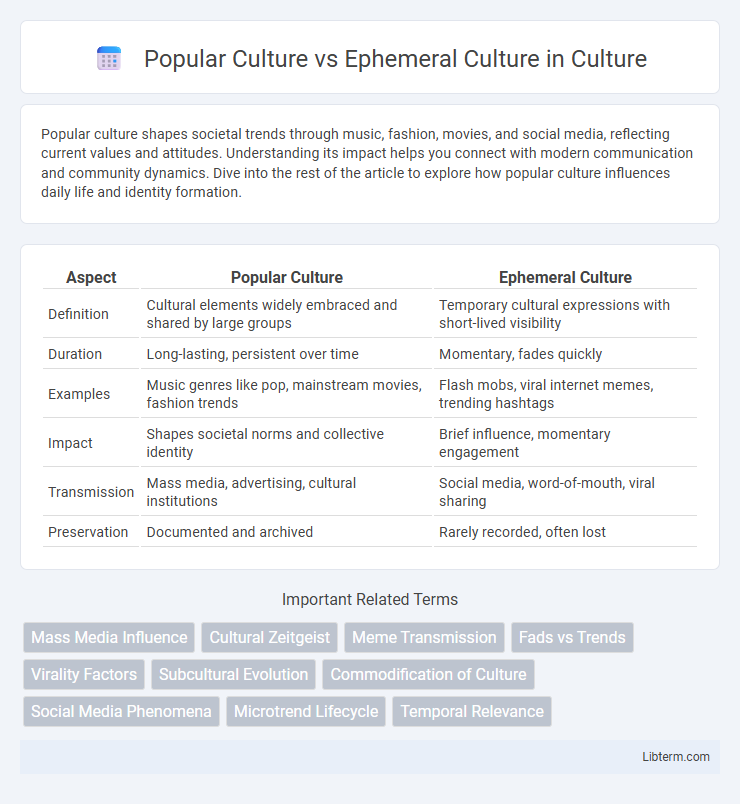Popular culture shapes societal trends through music, fashion, movies, and social media, reflecting current values and attitudes. Understanding its impact helps you connect with modern communication and community dynamics. Dive into the rest of the article to explore how popular culture influences daily life and identity formation.
Table of Comparison
| Aspect | Popular Culture | Ephemeral Culture |
|---|---|---|
| Definition | Cultural elements widely embraced and shared by large groups | Temporary cultural expressions with short-lived visibility |
| Duration | Long-lasting, persistent over time | Momentary, fades quickly |
| Examples | Music genres like pop, mainstream movies, fashion trends | Flash mobs, viral internet memes, trending hashtags |
| Impact | Shapes societal norms and collective identity | Brief influence, momentary engagement |
| Transmission | Mass media, advertising, cultural institutions | Social media, word-of-mouth, viral sharing |
| Preservation | Documented and archived | Rarely recorded, often lost |
Defining Popular Culture and Ephemeral Culture
Popular culture encompasses widely recognized and enduring cultural elements such as music, films, fashion, and social practices that shape collective identities and influence societal norms. Ephemeral culture refers to transient cultural phenomena including viral trends, social media memes, and temporary fads that reflect immediate societal interests but lack lasting impact. Understanding the distinction highlights how popular culture sustains long-term cultural significance, while ephemeral culture captures fleeting moments of public consciousness.
Historical Evolution of Cultural Trends
Popular culture has evolved through mass media, technology, and globalization, creating widely accessible and enduring cultural trends such as music genres, fashion styles, and social media phenomena. Ephemeral culture, characterized by short-lived fads and viral content, reflects rapid societal changes and the immediacy of digital communication platforms like TikTok and Instagram. The historical evolution of cultural trends reveals a shift from localized, tradition-based practices to instantaneous, digital-driven expressions influenced by global connectivity.
Influences Driving Popular Culture
Popular culture is shaped primarily by mass media, technological advancements, and consumer behavior, driving widespread trends and shared experiences. Influences such as social media platforms, entertainment industries, and globalization contribute to the rapid dissemination and adoption of ideas, fashion, and language across diverse demographics. In contrast, ephemeral culture centers on transient, localized, or niche expressions that reflect immediate social contexts, often lacking the broad reach and longevity of popular culture phenomena.
Characteristics of Ephemeral Culture
Ephemeral culture is characterized by its transient nature, consisting of trends, fads, and practices that rapidly emerge and disappear within a short timeframe. It often reflects contemporary social moods, technological influences, and media-driven phenomena that lack long-lasting historical or cultural significance. Unlike popular culture, ephemeral culture is marked by its spontaneous, temporary appeal and frequent reinvention.
The Role of Technology in Shaping Culture
Technology accelerates the diffusion of popular culture, enabling rapid global access to music, film, and social media trends that define collective experiences. Ephemeral culture, characterized by transient and situational practices, is increasingly shaped by digital platforms that prioritize immediacy and novelty. The interplay between technology and culture fosters continuous innovation while challenging traditional boundaries of cultural preservation and transformation.
Media and Viral Phenomena: A Comparative Analysis
Popular culture thrives on mass media platforms, driving widespread engagement through consistently shared themes, celebrities, and trends that maintain relevance over time. In contrast, ephemeral culture leverages viral phenomena on social media, rapidly capturing attention but often fading quickly as new trends emerge. The interplay between traditional media and digital virality highlights a dynamic ecosystem where enduring cultural icons coexist with fleeting moments of collective fascination.
Longevity vs. Transience in Cultural Impact
Popular culture demonstrates longevity by continuously influencing society through enduring media, fashion, and traditions that evolve but remain recognizable over decades. Ephemeral culture, characterized by its transience, captures momentary trends and viral phenomena that achieve rapid impact but fade quickly from public consciousness. Understanding the dynamic between lasting cultural artifacts and fleeting trends highlights the interplay between persistent identity and immediate social expression.
Social Identity and Cultural Participation
Popular culture shapes social identity by fostering shared experiences through widely accessible media, music, and fashion, allowing individuals to express belonging within large, diverse communities. Ephemeral culture, characterized by transient trends and rapidly changing practices, influences cultural participation by encouraging active engagement and continual adaptation to emerging social norms. Together, these cultural forms interact to create dynamic identities where long-lasting communal ties coexist with fluid, momentary expressions of personal and group identity.
Case Studies: Examples of Each Cultural Type
Popular culture is exemplified by global phenomena such as the rise of social media platforms like TikTok and franchises like Marvel Cinematic Universe, which shape mass entertainment and shared trends. Ephemeral culture is illustrated by transient events like flash mobs, viral internet challenges, and temporary street art installations, reflecting momentary expressions tied to specific times and contexts. Case studies reveal that while popular culture sustains long-term influence and commercialization, ephemeral culture captures immediate social sentiments and rapid innovation without lasting permanence.
Predicting the Future: Merging Popular and Ephemeral Cultures
Predicting the future involves analyzing trends where popular culture's mass appeal intersects with the transient nature of ephemeral culture, such as viral social media phenomena. The fusion of enduring cultural symbols with fleeting digital content creates dynamic forecasts for emerging consumer behaviors and technological innovations. By studying this hybridization, researchers can anticipate shifts in media consumption patterns and cultural values with greater accuracy.
Popular Culture Infographic

 libterm.com
libterm.com